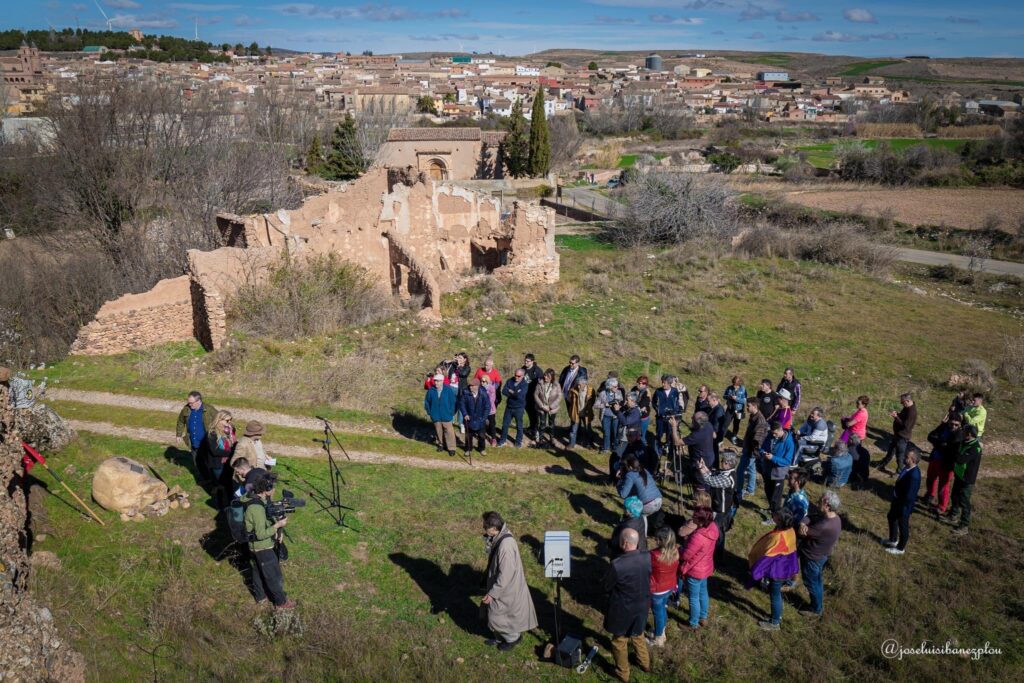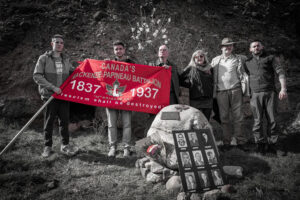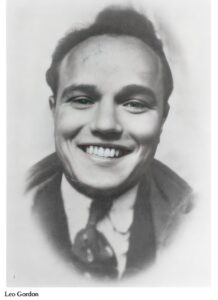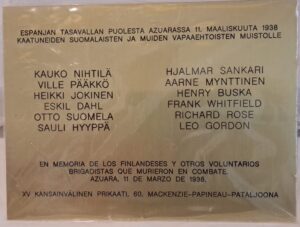Honoring the Mac-Paps and Leo Gordon in Azuara, Spain
In 1938, part of the Mackenzie-Papineau Battalion of the International Brigades, lost their lives while providing cover for their retreating comrades in Azuara. This year, the town hosted a tribute to these long-forgotten anti-Fascist fighters.
Eighty-five years ago, a dozen volunteers, part of the Mackenzie-Papineau Battalion of the International Brigades, lost their lives while providing cover for their retreating comrades in the town of Azuara, in the Aragon region of Spain. In March 1938, they were part of what came to be known as the Great Retreats from the massive offensive launched by Fascist forces against Republican units in the Aragon. This particular group embodied the global makeup of the men and women who came to the aid of the Spanish Republic: 8 Finns, 3 Canadians, and one American.
On March 11, 2023, Azuara hosted a tribute to these long-forgotten anti-Fascist fighters, placing a plaque with their names in memory of all members of the International Brigades. A bouquet of flowers (red, yellow, and blue) accompanied a banner with photos of the volunteers. The event attracted coverage from Finnish national television, support from the City Council of Azuara, and its mayor, Joaquin Alconchel, and an enthusiastic audience of about 50 local citizens.
After the dedication, Erik Salvador Artigas led a guided tour of the main scenes of the battle, including various caves below the hill facing the village. One was an ammo dump, but others were full of civilians hiding from the fighting. One old woman remembered coming out after the battle as a child and having to step over thirteen dead Mac-Paps to return to her destroyed family house. The group then walked up the hill, with its spectacular view of the village, where the men met their fate.
I was asked to write a tribute to Leo Gordon, the lone American and my father’s cousin, which was read aloud at the event. I had vaguely learned about his death while growing up. But it was only when I began digging into his life and his experiences in Spain, that I realized what a truly heroic death he and his Mac-Pap comrades had endured. Nearly a century later, Azuara remembers.
Tribute to Leo Gordon
Leo (Mendelowitz) Gordon was born in New York City in 1913 to Hungarian-Jewish immigrants. In 1931, after his mother died, Leo and his younger brother Joe set off on a cross-country trip, the two teenagers hitching rides and hopping freight trains, looking for work and adventure. Their travels brought them face-to-face with an America suffering from the worst economic depression in its history. Mass unemployment, hunger, racial discrimination, and fear for the future were everywhere. Upon returning to New York, Leo worked as a presser in the garment industry, became active in union organizing, and joined the Young Communist League. For Leo and his brother Joe, the links between America’s Depression politics and fighting fascism in Spain were quite clear. Joe Gordon was among the first 96 American volunteers to head for Spain in December 1936. Leo Gordon followed in late July 1937.
In Spain, Leo was assigned to the Mackenzie-Papineau Battalion, originally created for Canadian volunteers, as part of the English-speaking Fifteenth International Brigade. Leo was part of a machine gun company and he did not have to wait long to see action. On October 13, the Mac-Paps entered the lines at Fuentes del Ebro, with the Republic hoping to take that town on the way to Zaragosa. Following Fuentes del Ebro Brigade, leaders cited Leo for outstanding action, helping take over leadership of his company after the entire command fell dead. He received a promotion to lieutenant, second in command of a machine company, just before the Mac-Paps next major action, in the battle of Teruel. Fighting took place in frigid, snowy weather; the cold made it more difficult to maneuver and frostbite caused many casualties. Leo described his own shrapnel wound in a letter: “Was fixing a jam when a terrific concussion bowled me over. Got up with my head spinning, the air full of dust, more guys pawing the ground. Clapped my hand to the side of my head, warm liquid trickled thru my fingers. Wondered if that one had my name written on it. But it was spelled wrong.”
Leo recovered quickly and returned to the front, now as a lieutenant in command of a machine gun company. In early March 1938, Nationalist forces unleashed an unprecedented coordinated attack across the entire Aragon front. On March 11, brigade leaders ordered the Mac-Paps to evacuate. Leo Gordon commanded two machine gun crews placed on an open spot atop a high cliff overlooking Azuara. It could not be reached in daylight, as it was under direct enemy fire. When retreat orders came through, the men were cut off. Mac-Pap Captain Nilo Makela and Commissar Saul Wellman tried to contact them but failed. “We shouted, fired our pistols,” Wellman recalled, “trying to attract their attention, but we were unsuccessful. There was too much noise in the air for them to notice us…We remained there for almost a half-hour, but seeing it hopeless, we left and rejoined the battalion. Probably all of them died, holding their positions to the very end. We know that those two crews held up the enemy advance at that spot between eight and twelve hours.”
What exactly happened to Leo? A lone survivor, Canadian volunteer Perry Hilton, was captured and spared only through a quirk of luck. Hilton’s tall frame amused one of his Spanish captors, a short man, and the horseplay evidently took the edge off. A Nationalist officer later told Hilton that all the men who had stayed behind on the cliff were captured, lined up, and shot. The officer told Hilton this was a mistake, as the fascist forces now had orders to take Internationals as prisoners when captured. If he was indeed captured, those orders came too late for Leo Gordon. He was 25 years old.
Daniel Czitrom is Chair Emeritus of the ALBA Board of Governors.
















